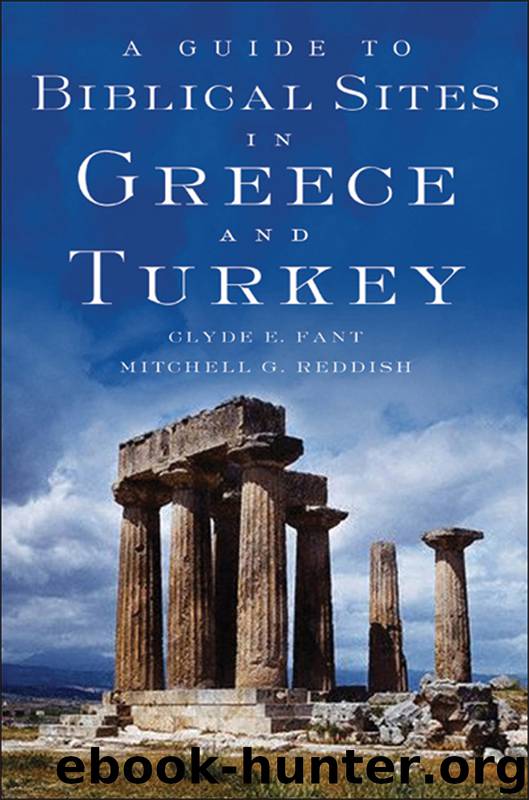Guide to Biblical Sites in Greece and Turkey by Fant Clyde E.; Reddish Mitchell G.; Reddish Mitchell G. & Mitchell G. Reddish

Author:Fant, Clyde E.; Reddish, Mitchell G.; Reddish, Mitchell G. & Mitchell G. Reddish
Language: eng
Format: epub
Publisher: Oxford University Press
Published: 2006-03-17T05:00:00+00:00
Biblical Significance
Of all the cities mentioned in the New Testament that were visited by Paul, Ephesus is the only one that was also addressed in the book of Revelation. According to Acts, Paul visited the city of Ephesus on both his second and third missionary journeys. On his second journey his visit was brief. Priscilla and Aquila (wife and husband) accompanied Paul to Ephesus. After engaging in a discussion in the synagogue, Paul left Ephesus, leaving Priscilla and Aquila in the city, and promised to return (Acts 18:18–20). Sometime after Paul left Ephesus, another Christian, Apollos of Alexandria, came to Ephesus. Discovering that his understanding of the Christian faith was deficient in some areas, Priscilla and Aquila instructed him more fully (Acts 18:24–28). After Apollos left to go to Greece, Paul returned to Ephesus during his third journey. This time he spent a considerable length of time in Ephesus. (Acts 19:8–10 says Paul spent two years teaching and preaching in the hall of Tyrannus in Ephesus, after having spent three months teaching in the synagogue there. Acts 20:31 says he spent three years in Ephesus.)
During this stay in Ephesus Paul aroused the anger of the city’s guild of silversmiths, who had a prosperous business selling silver shrines of Artemis, the goddess whose impressive temple was located in Ephesus. Paul’s preaching was harming their business and challenging the worship of Artemis. The silversmiths began to chant, “Great is Artemis of the Ephesians!” A near riot ensued, in which the people of the city gathered in the theater, dragging two of Paul’s traveling companions, Gaius and Aristarchus, with them. Paul wanted to go into the theater, presumably to rescue his companions or to help quell the disturbance, but his friends and even some of the city officials persuaded him not to go. After the disturbance had lasted for two hours, the town clerk was able to bring order to the crowd and end the outbreak. Shortly after this event Paul left Ephesus and traveled to Macedonia (Acts 19:1–20:1). At the end of this third journey Paul bypassed Ephesus on his eventual return to Jerusalem. Acts 20:16 states that Paul bypassed the city because of his eagerness to return to Jerusalem. Perhaps the disturbance during his previous visit contributed to that decision as well. Rather than stopping at Ephesus to visit the Christians, Paul sent a message to them from Miletus and asked the elders of the church at Ephesus to come meet him there (Acts 20:17).
When Paul wrote the letter of 1 Corinthians he was in Ephesus, likely during the lengthy stay mentioned in Acts 19 (see 1 Cor 16:8). He perhaps also wrote portions of 2 Corinthians from Ephesus. Some scholars suggest that Paul may have been imprisoned at Ephesus for part of this period and that during this imprisonment he wrote the letters of Philippians and Philemon, as well as Colossians (if actually by Paul). Whereas there is no evidence that Paul was indeed a prisoner in Ephesus, he does
Download
This site does not store any files on its server. We only index and link to content provided by other sites. Please contact the content providers to delete copyright contents if any and email us, we'll remove relevant links or contents immediately.
| Africa | Americas |
| Arctic & Antarctica | Asia |
| Australia & Oceania | Europe |
| Middle East | Russia |
| United States | World |
| Ancient Civilizations | Military |
| Historical Study & Educational Resources |
The Daily Stoic by Holiday Ryan & Hanselman Stephen(3107)
The Fate of Rome: Climate, Disease, and the End of an Empire (The Princeton History of the Ancient World) by Kyle Harper(2870)
People of the Earth: An Introduction to World Prehistory by Dr. Brian Fagan & Nadia Durrani(2619)
Ancient Worlds by Michael Scott(2492)
Babylon's Ark by Lawrence Anthony(2427)
Foreign Devils on the Silk Road: The Search for the Lost Treasures of Central Asia by Peter Hopkirk(2385)
The Daily Stoic by Ryan Holiday & Stephen Hanselman(2341)
India's Ancient Past by R.S. Sharma(2293)
MOSES THE EGYPTIAN by Jan Assmann(2275)
The Complete Dead Sea Scrolls in English (7th Edition) (Penguin Classics) by Geza Vermes(2135)
Lost Technologies of Ancient Egypt by Christopher Dunn(2109)
The Earth Chronicles Handbook by Zecharia Sitchin(2100)
24 Hours in Ancient Rome by Philip Matyszak(1973)
Alexander the Great by Philip Freeman(1960)
Aztec by Gary Jennings(1877)
The Nine Waves of Creation by Carl Johan Calleman(1783)
Curse Tablets and Binding Spells from the Ancient World by Gager John G.;(1768)
Before Atlantis by Frank Joseph(1740)
Earthmare: The Lost Book of Wars by Cergat(1715)
